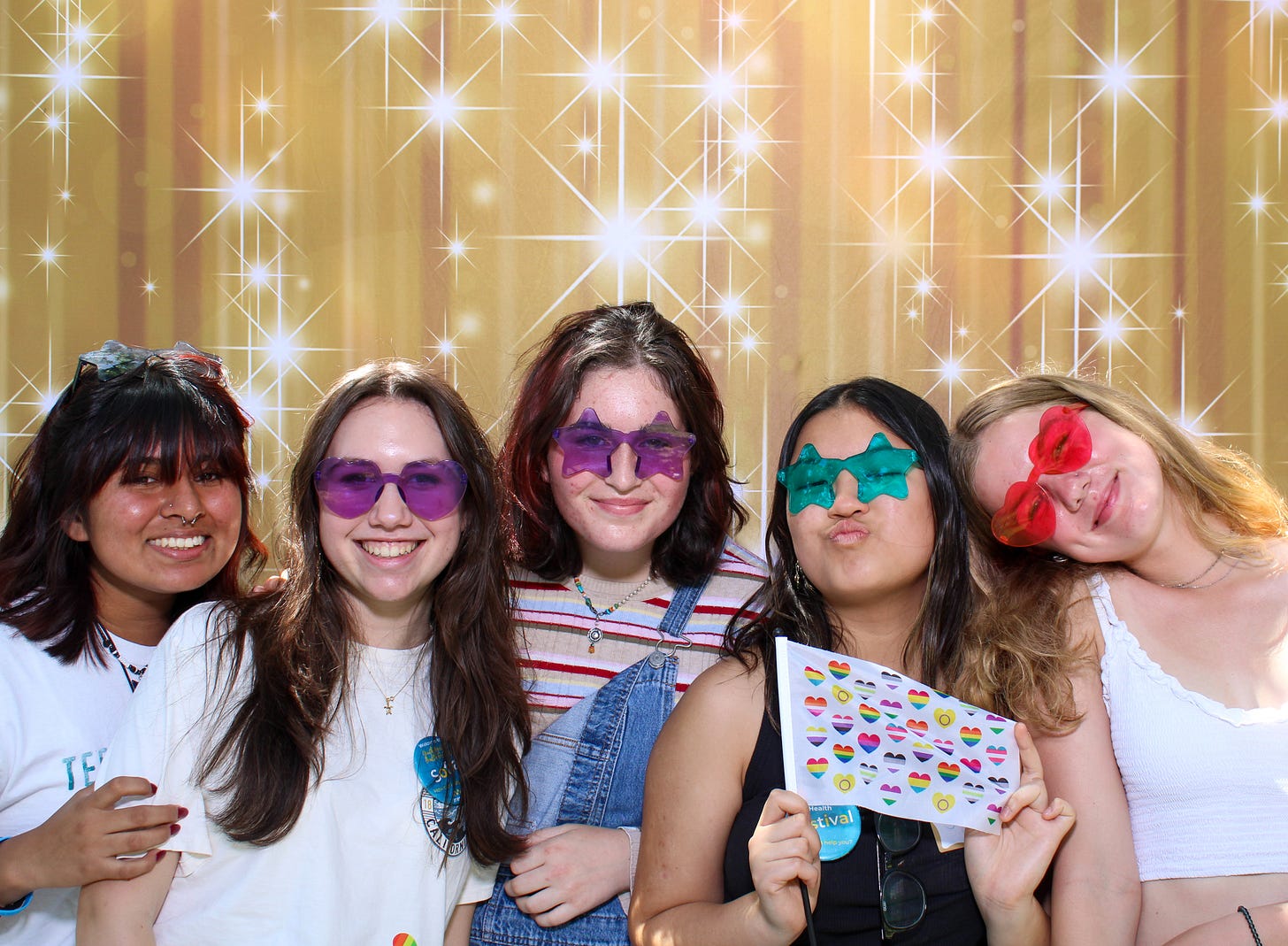More Than a Phase: Supporting Teens Through Real Struggles
By Kailee Musgrove and Charlotte Hajer
NAPA VALLEY, Calif. — In most parts of the world we think of adolescence as a time of transformation: a bridge between childhood and adulthood. But for teens this stage of life can feel less like a bridge and more like being tossed into the deep end of the pool and asked to swim without knowing how.
Adolescence is defined by growth and change — and while these can bring excitement and discovery, they can also lead to confusion, stress and serious mental health challenges. To learn a little more about the mental health needs of teens in our community, I recently sat down with Kailee Musgrove, a therapist at Mentis who specializes in supporting LGBTQIA+ youth.
It’s about meeting them where they are, not where we expect them to be.
When people hear the word “teenagers,” they often think of puberty — arguably one of the most intense periods of physical change we experience in our lifetimes. But, Musgrove explains, the transitions of adolescence go far beyond physical growth. Emotionally and socially, teens are navigating uncharted territory. In fact, one of the core tasks of adolescence is figuring out who you are as a human being.
Developmental psychologist Erik Erikson referred to this stage as “identity versus role confusion,” a life stage that stretches from early adolescence into the early 20s. Teens are exploring social roles, testing boundaries, and experimenting with identity as they ask themselves “Who am I?” and “Where do I fit in?”
In this process, Musgrove says, teens often perform a delicate dance between seeking belonging and craving autonomy. They yearn for independence but also still rely heavily on caregivers for emotional and practical support. It’s a time of intense connection with peers while also wrestling with a need for self-definition. And it’s in this swirl of exploration and uncertainty that many teens begin to develop the core values and beliefs that will shape their adult lives.
However, with all this change comes vulnerability. The teenage years are often when mental-health issues first emerge. Depression, anxiety and even suicidal ideation can begin to surface during this period, sometimes setting the stage for lifelong mental health challenges if left unaddressed. Adolescents are particularly susceptible because they’re dealing with enormous pressures at a time when their brains are still developing the capacity for emotional regulation and decision-making.
The Unique Mental Health Needs of Adolescents
Despite the frustrations and difficulties that can come with adolescence, it’s also an exciting time, Musgrove says. Teens are figuring out what they like and what they don’t. They’re building deeper friendships and exploring independence in ways that can be exhilarating. There’s a sense of possibility that’s unique to this stage of life.
But those highs can be matched by equally intense lows: The emotional rollercoaster is very real. And while teens may look like they’re pulling away from the adults in their lives, they still need a consistent, supportive presence to help them through the ups and downs. Musgrove explains that being there for the teens in your life — without judgment — matters more than ever.
Adults play a critical role in providing safety and steadiness. Offering unconditional love and radical acceptance helps teens feel secure enough to explore their identities and express themselves authentically. It’s about meeting them where they are, Musgrove emphasizes, not where we expect them to be.
At the same time, it’s important to recognize our own limits. Musgrove acknowledges that supporting a teen can be exhausting — and it’s more than OK to call for backup when you need it. In fact, it can be incredibly beneficial for teens to have positive social interactions with peers, which is why peer support programs at schools and community organizations can be so valuable. And of course, connecting your teen with professional mental-health resources when needed not only ensures they get the help they need but also gives caregivers invaluable support to stay grounded and present.
Supporting Marginalized Teens: Meeting Unique Challenges
While adolescence is a universally challenging time, Musgrove explains that youth who belong to marginalized communities often face even more complex struggles. Teens who are Black, Indigenous and/or People of Color (BIPOC), LGBTQIA+, living with disabilities or navigating other marginalized identities often confront additional societal pressures that make identity formation even more difficult.
Imagine being at a developmental stage where you’re encouraged to explore who you are only to be told by society that you don’t fit or worse, that you don’t belong. For BIPOC youth, systemic racism and cultural biases can create barriers to self-expression and acceptance. For LGBTQIA+ teens, the fear of rejection from family, friends and community can feel overwhelming. And for youth with disabilities, navigating a world that often overlooks or dismisses their experiences can add layers of isolation and frustration.
The data are sobering. LGBTQIA+ youth, for example, are more than four times more likely to attempt suicide than their straight peers. In 2023, The Trevor Project reported that 41% of LGBTQ+ youth in the United States seriously considered suicide in the past year. Among transgender and nonbinary youth, that number was closer to 50%. These statistics represent a profound mental health crisis — but they also call us to action.
As adults, caregivers and community members, we can be powerful allies. The most common fear LGBTQ+ youth express is rejection from the people they love most. Leading with love, acceptance and genuine curiosity about who they are can make a world of difference. We need to affirm their identities, advocate for their rights and ensure that they have access to mental health resources designed for their unique needs.
What Teens Need Most
In the end, all teens need to feel seen, heard and valued. Whether they’re struggling with anxiety about the future, dealing with discrimination or just trying to figure out who they are, they need adults who show up consistently and without conditions. They need space to make mistakes, room to experiment with identity and encouragement to keep going even when it’s hard.
Adolescence is messy, but it’s also full of potential. If we meet teens with empathy, patience and radical acceptance, we can help them navigate this time of transition with resilience and hope. Our support today lays the foundation for their strength tomorrow.
No one should be made to feel invisible — especially not our youth, who are working so hard to figure out who they are and where they belong. Let’s make sure they know they’re not alone.
Mental Health Resources
If you or someone you love is experiencing a mental health crisis, call or text the 988 Suicide and Crisis Lifeline.
If you or someone you love needs mental health or wellness support, please visit our Mentis Community and Youth Resource Database. Mentis is one of Napa’s oldest nonprofits and provides bilingual, affordable mental health services to people of every age and income level.
Blue Skies Ahead at Mentis Wellness Campus
Saturday, April 26, 1 to 4 p.m. Mentis hosts “Blue Skies Ahead,” an afternoon of food, wine, live Cajun music and fundraising to support mental health services in Napa Valley, featuring a silent and live auction along with a Fund-the-Future paddle raise. Parking is provided, and carpooling is encouraged. For more information and to RSVP, visit their website. 1272 Hayes St., Napa.
—
Charlotte Hajer is Mentis’ development director. She holds a Ph.D. in cross-cultural mental health and loves to write about the way individuals experience and navigate the social and cultural world around them.
Kailee Musgrove is a mental health therapist at Mentis with an Associate Marriage and Family Therapy license. A Napa native, she returned to serve the community after earning her master's degree in Marriage and Family Therapy from California State University Northridge. She specializes in supporting LGBTQ+ youth through Mentis’ Queer Trans Affirm Project (QTAP) in partnership with LGBTQ Connection.










